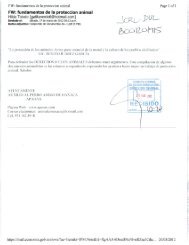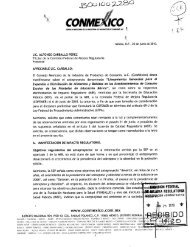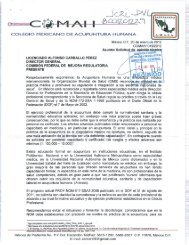Untitled
Untitled
Untitled
You also want an ePaper? Increase the reach of your titles
YUMPU automatically turns print PDFs into web optimized ePapers that Google loves.
1 Nutrition and Health Claims (CAC/GL 23-1997)<br />
1. SCOPE<br />
GUIDELINES FOR USE OF NUTRITION AND HEALTH CLAIMS<br />
Adopted in 1997. Revised in 2004. Amended in 2001, 2008 and 2009.<br />
CAC/GL 23-1997<br />
Nutrition claims should be consistent with national nutrition policy and support that policy. Only nutrition claims<br />
that support national nutrition policy should be allowed.<br />
Health claims should be consistent with national health policy, including nutrition policy, and support such<br />
policies where applicable. Health claims should be supported by a sound and sufficient body of scientific<br />
evidence to substantiate the claim, provide truthful and non-misleading information to aid consumers in<br />
choosing healthful diets and be supported by specific consumer education. The impact of health claims on<br />
consumers’ eating behaviours and dietary patterns should be monitored, in general, by competent authorities.<br />
Claims of the type described in section 3.4 of the Codex General Guidelines on Claims are prohibited.<br />
1.1 These guidelines relate to the use of nutrition and health claims in food labelling and, where required by the<br />
authorities having jurisdiction, in advertising 1 .<br />
1.2 These guidelines apply to all foods for which nutrition and health claims are made without prejudice to specific<br />
provisions under Codex standards or Guidelines relating to Foods for Special Dietary Uses and Foods for<br />
Special Medical Purposes.<br />
1.3 These guidelines are intended to supplement the Codex General Guidelines on Claims and do not supersede<br />
any prohibitions contained therein.<br />
1.4 Nutrition and health claims shall not be permitted for foods for infants and young children except where<br />
specifically provided for in relevant Codex standards or national legislation.<br />
2. DEFINITIONS<br />
2.1 Nutrition claim means any representation which states, suggests or implies that a food has particular<br />
nutritional properties including but not limited to the energy value and to the content of protein, fat and<br />
carbohydrates, as well as the content of vitamins and minerals. The following do not constitute nutrition claims:<br />
(a) the mention of substances in the list of ingredients;<br />
(b) the mention of nutrients as a mandatory part of nutrition labelling;<br />
(c) quantitative or qualitative declaration of certain nutrients or ingredients on the label if required by national<br />
legislation.<br />
2.1.1 Nutrient content claim is a nutrition claim that describes the level of a nutrient contained in a food.<br />
(Examples: “source of calcium”; “high in fibre and low in fat”.)<br />
2.1.2 Nutrient comparative claim is a claim that compares the nutrient levels and/or energy value of two or more<br />
foods.<br />
(Examples: “reduced”; “less than”; “fewer”; “increased”; “more than”.)<br />
2. 2 Health claim means any representation that states, suggests, or implies that a relationship exists between a<br />
food or a constituent of that food and health. Health claims include the following:<br />
2.2.1 Nutrient function claims – a nutrition claim that describes the physiological role of the nutrient in growth,<br />
development and normal functions of the body.<br />
1 Advertising means any commercial communication to the public, by any means other than labelling, in order to promote directly or indirectly, the sale or<br />
intake of a food through the use of nutrition and health claims in relation to the food and its ingredients.
















